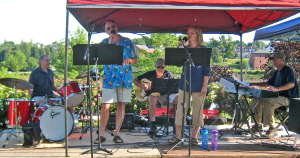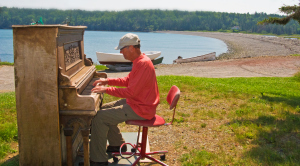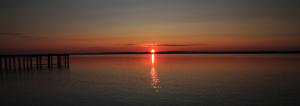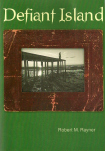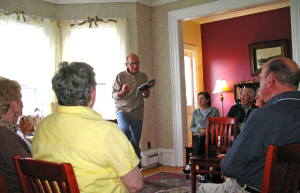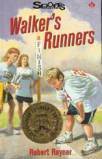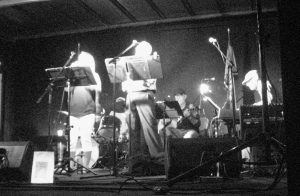Robert Rayner's Blog, page 9
August 15, 2014
Beginnings and Endings 4
Footprints (Breakwater/Jesperson 2008) is a thriller that poses the moral question of how far you should pursue a cause in which you truly believe when no-one will listen to you – and how extreme the action you should take in pursuit of that cause.
It’s one of those stories that, as I finished writing, I really liked – for both its characters and its plot – and that I thought was really strong, and that got good reviews (“… astute, contemporary and engaging …”, “… excellent, character-driven … relevant and contemporary …”)
And that had absolutely pitiful sales.
I’m conceited enough (or stupid enough – take your choice) to still believe in it, and every time I use it in readings the audience response confirms that belief. Especially I like both beginning and ending. Here’s the preamble.
She glides from the shelter of the trees, clutching the device carefully in one hand, and is across the road, pressed against the wall of the cottage grounds, before the boys have time to worry about someone seeing her. Keeping low, she peers around the stone gatepost. No sign of Anderson’s men. She eases herself up until she can reach the security panel, and presses in the code. She flattens herself back against the wall as the tall wrought-iron gates swing silently open. She has ten seconds before they close of their own accord. She peers around the gatepost again. Still no sign of life. With a glance back to where the boys wait in the woods, she sprints to the barn and slides into the space between it and the high garden wall. As she lowers the device towards the hole under the barn, the timer already set, she reflects: How did a walk on the beach lead to this?


August 8, 2014
Trash Trailers?
I often wonder how effective book trailers are, and whether they’re worth the time it takes to make them.
Does anyone watch them? How would anyone discover a book trailer unless it depicted a book by a favourite author, in which case readers would probably know about the book anyway, if they hadn’t already bought it?
And does anyone actually rush out and buy a book because somehow they stumbled upon its trailer?
Writing about White Head Island (‘Island Eden’) a couple of weeks ago reminded me of the trailer I put together for Defiant Island (DreamCatcher Publishing 2007), which – self-indulgently (sorry) – I can’t resist linking here.


August 1, 2014
Border Music
Woke to the sound of rain.
Eat breakfast looking out at the rain.
Walked in the rain.
Abandoned all thoughts of the fun of playing al fresco, as planned, as I loaded amp and keyboard into the car in the late afternoon with rain still threatening and set off for the border town of St. Stephen, New Brunswick, for that town’s Summer Sounds series of concerts, rain actually falling as I drove.
But – presto! – the sun came out on the way, and we (the band, that is, Stepping Out) played to a big and responsive crowd on the St. Stephen waterfront beside the St. Croix River that forms the border between St. Stephen and Calais, U.S. (regrettably pronounced Callous, but you might as well accept it because if you say CAL-ay no-one will know what you’re talking about).
Here’s another al fresco musical moment, from another time and place. Unfortunately the piano was beyond being played upon, but it made a fun picture.


July 25, 2014
Island Eden
Whoop of a buoy somewhere out in the channel. Twittering of finches. Distant crunch of surf. Chug of the ferry, and its horn announcing arrival and departure. Keening of gulls. Buzz of a fly and drone of a bee. Hoarse honking barks of Canada geese passing between marsh and sea.
We’re sitting at the rear of a cottage on White Head Island, separated from the sea only by a bank of wild flowers (they seem to grow all at once out here; wild rhododendron flowering at the same time as fireweed, for example) and a scattering of the white rocks that give the island its name.
It takes a ninety minute ferry from Blacks Harbour, New Brunswick, to Grand Manan Island, passing the other principal Fundy Isles of Campobello Island and Deer Island, as well as the three islands that make up The Wolves (so called not because they’re inhabited by wolves, but after a Glooscap legend), and then another ferry ride, this one a half hour, to get to White Head.
It’s an Eden, this little island, with a year round population of less than 200 that swells increasingly and ominously in the summer, ominously because of the fear that it heralds a changing character from working community – a ‘real’ community – to summer retreat, out of economic inevitability and necessity, maybe, but sad, nevertheless.
I tried to tackle the subject in Defiant Island, borrowing from White Head’s geography, and some of its work and social characteristics, although the novel is definitely not ‘about’ White Head Island.
Here’s my favourite Defiant Island blurb:
A gentle, moving portrayal of the deliberate, perhaps necessary, political destruction of a community . . . A story about independence, and preserving independence against various forces – the vicissitudes of love, and of economics, and of old age . . . A story about love . . .
That’d be not just romantic love, and love between old friends, but also love of an island.


July 18, 2014
The Hazards of Playing Music on a Summer Night
As soon as the flashing lights started in the corner of my eye, I knew what was going on. I put down my ancient 100W Traynor amp that weighs about the same as an elephant (okay – I’ve never tried to lift an elephant, but you know what I mean) and sat on the tailgate of the car until the lights disappeared. We were due to play in about a half hour in the summer music series in St. George, the little New Brunswick town where I live, ‘we’ being Stepping Out, our five piece band of Tony on drums, John on guitar, Julie and Dave on vocals, and me on keyboard. I knew the others would arrive at any moment, and when they did, someone picked up the amp on the way past and I, rather gingerly, took in the lighter stuff.
But no more flashing lights, and we played a good concert, and you really can’t beat music on a summer night, preferably outdoors in a band stand, although the unpredictable weather made that impossible.
Next day the eye doc confirmed what I’d guessed: Just a torn retina, the only lasting effect being a bunch of floaters that annoy the heck out of me in certain lights.
The other day it was the same gig, a year later, and I suddenly remembered the incident as I hauled the amp from the back of the car. I’d done it dozens of times since then, of course, but lifted a little more cautiously than usual, all the same.
We played to an enthusiastic and appreciative crowd, several of whom were kind enough to express their enjoyment after the concert and in the days following (it’s a bit like teaching: If someone pays you a compliment on your work, you’re thrilled out of all proportion), and we thank everyone for coming out and hope to see them all again when we play on the waterfront in the Summer Sounds series in the nearby border town of St. Stephen.
On the video: A smoothie! Unforgettable.


July 11, 2014
St. Martins Idyll

Writing doesn’t bring many perks, but one it did provide this week was an overnight stay with supper at the elegant Tidal Watch Inn in the little seaside town of St. Martins, New Brunswick, on the Bay of Fundy, after presenting an evening reading to visitors from all over the US who were taking part in the Road Scholar programme of educational travel (formerly Elderhostel).
When you step into the Tidal Watch Inn you literally step back in time. It was built over a century ago when St. Martins was a major shipbuilding centre – in fact the third largest producer of wooden sailing vessels on the eastern seaboard of North America, launching over 500 ships that sailed the world – and was one of the wealthiest communities in the British Empire.
I couldn’t decide what to read to this varied and erudite group. I feared being too heavy; didn’t want to be too flippant, either. Would my listeners be insulted if I asked them to roll back a few years while I read an episode from one of the YA books? In the end I settled on a moody and provocative episode from The Ragged Believers, which visitors to New Brunswick always find interesting, I think because it’s so steeped in local atmosphere, then a wrenching episode from Second Wind, followed by a lighter episode from Defiant Island. I finished – riskily! – with a couple of favourite YA extracts which always go over well with YA audiences, the car wash scene from Just for Kicks, and Toby and Conrad making cookies in Total Offence.
So how did it go? As I always say – you’re asking the wrong person.
But the answer to one question from the audience – How do you want your stories to be received? – sets up a rough and ready judgement for both stories and readings:
I want them to entertain. (Check.)
I want them to move. (Check.)
I want them to resonate. (You never know.)
Thanks to Kathy at the Tidal Watch Inn for this St. Martins idyll.


July 4, 2014
Unlikeable Hero
The accident had just happened when I came upon it. I could tell it was bad, the way the truck was skewed across the road, the car half under it. Police and ambulance were arriving and traffic was held up. As I watched, the truck driver came from behind the remains of the car carrying the lifeless form of the small child he’d lifted from it.
I always carry a camera – it’s one of my things – and the thought occurred to me as I watched: That scene would make an award winning, front page filling news photograph, if someone had the – the what? – the journalistic objectiveness, the ability to distance oneself, the nerve, the heartlessness, the presence of mind, to take it.
As a former journalist whose work included covering accidents – could I have taken it? (I didn’t.)
Could you?
The incident formed the genesis, many years later, of my YA novel, Scab (J. Lorimer & Co. 2010), although I changed the picture taking dilemma facing the young apprentice photojournalist of the title.
What prompted these reflections on Scab was a friend sending me a MacLean’s article that asked, with reference to Herman Koch’s dark and macabre novel, The Dinner, ‘Who needs a likeable character, anyway?’
The success of The Dinner answers the question: No, you don’t need a likeable character.
Still, I think you need a central character who may not be likeable, but whom the reader at least cares about.
Scab is not likeable. He’s prickly and rude and ruthless in the pursuit of his ambition to make memorable news photographs. He’s also vulnerable and deeply emotionally wounded. I keep a kind of informal poll on how readers feel about him and they’re split 50/50 between those who think him a despicable cad and those who, while not condoning his actions, sympathise with him and care about him.
How about you? Do you think characters need to be likeable? How do you feel about Scab?
Is he a cad – or sad?


June 27, 2014
Hating the Gym (Beginnings and Endings 3)
Hands up all the people who hated the gym when they were at high school.
Right. Me too. And my friends.
It wasn’t as if we were unathletic. We were tennis players and rugby players and cricket players and (above all) soccer players.
And agreed – kicking and chasing a ball, or trying to hit it with a chunk of wood before it gets past you and knocks over three little sticks stuck in the ground (cricket, in case you don’t recognise it), or whacking it backwards and forwards over a net, or throwing it to one another while you dodge being ground into the mud, are pretty mindless activities, but that’s the nature of sport, and at least they’re fun, unlike having to throw yourself at a vaulting horse with the attendant dangers of self-mutilation, or having to swing from one horizontal bar to the other, wondering whether hands or teeth are going to make contact with the lower one first.
But above all it was the atmosphere of backslapping jockism we despised.
That and the hearty exhortations and testosteronic exhibitionism of the gym teacher.
All of which gave me the beginning of Walker’s Runners (J. Lorimer & Co. 2002), which I’ve used so many times at readings I can almost do it from memory.
Toby hated the gym.
He hated it for its noise – its triumphant shouts and derisive hoots. He hated it for its smell of mouldering sneakers and frantic sweat. He hated it for what it represented: a shallow comradeship and noisy jockism …
And he hated it for the humiliation he feared he feared every time he entered it, the humiliation that awaited him in just a few seconds, unless he could fend it off with a few good wisecracks.
His grade six class was standing in six groups at the end of the gym, five students in each group. Ms. Watkins, the phys. ed. teacher, had pointed to six students and told them they were team leaders, and then each team leader had taken turns choosing whom they wanted on their team. That was humiliation number one. Toby knew he was overweight, and he knew he was slow, and he knew he’d be the last to be chosen.
Every time I read this, I pause at and he knew he’d be …
And every time the audience (young or old) choruses last to be chosen.


June 20, 2014
Last Bus
When I was in high school the last bus home to the village where I lived was at 5:30 on weekdays and a daring 10:00 on Saturdays. After that, you walked the ten miles home, or hitched.
I never worried about missing the last bus. It was the price you paid for hanging out in the city with your friends after school or on Saturday nights. It was part of life, part of who you were.
Missing the last bus home left you with a strange, disembodied, floating sensation. You were expected to be – you were supposed to be – on the bus but here you were, setting off through the city on foot, no-one knowing where you were. It was like disappearing, almost as if, because you weren’t where you were supposed to be, you were no longer quite real.
It may seem a non-sequitorial stretch going from missing the last bus home to writing, but here goes …
My last book (Walking Away, Fierce Ink Press 2013) was an e-book, and I’m now in discussion with a publisher about publishing a teen novel – by me – in e-form, as well as having several other titles available in e-form, but I still harbour the foolish feeling that ebooks don’t really exist.
I know … I’m an outdated, outmoded, out of time, out of touch, anachronistic, nostalgia-soaked Luddite shouting into the void, “Don’t change anything!”, and of course I appreciate the advantages of ebooks – their ready availability, their ease of acquisition, their ease of transport – all to the advantage of the author!
But the feeling of unreality persists.
And if ebooks don’t really exist – how can the people who write them exist?
Wrestling with this thought, I had that same old disembodied feeling, the one brought on by missing the last bus home, and I still can’t decide whether I should embrace this potential opportunity, or turn it down and – as it were – miss the bus to the future.


June 13, 2014
Writers and Musicians
Glancing from the stage into the black void created by the stage lights glaring in our eyes, I had the fleeting thought: Writers and musicians have much in common. We send words and music into the void without ever really knowing what impact, if any, they are having on reader or listener.
Our band, Stepping Out, was playing in St. Stephen, New Brunswick, at the Relay for Life, in aid of the Canadian Cancer Society, 10:30 to midnight, last set of the night, just one of a line up of local bands giving their time and expertise.
Three of us look a tad extraterrestrial in the photos a friend grabbed. While Tony and John, on drums and guitar respectively, look normal (normal being a relative term, of course, especially where drummers are concerned), Dave and Julie, fronting with vocals, and me, tucked away at the side on keyboard, boast an unearthly glow from the shoulders up with the stage lights full on our faces.
At least that’s how the camera saw us. Participants, too, I suspect, looking up at the stage as they circled the field, where the only light came from the luminaries lit in memory of lost family and friends.
And looking out, all we could see was darkness, only the whoops and shouts and applause from the dark field reassuring us that there were people out there listening, just as the only reassurance that writers get that their words are being read and having any impact is receiving those oh-so-welcome emails, and letters, and comments at readings and signings and chance meetings.
Next band gig: Another benefit, Saturday 21st June, this one in support of the We’ve Got Your Back project, at the People’s Pub in St. Stephen. Stepping Out opens this time, the first in another line up of local bands playing through the afternoon and evening. Drop by if you’re in the vicinity.



